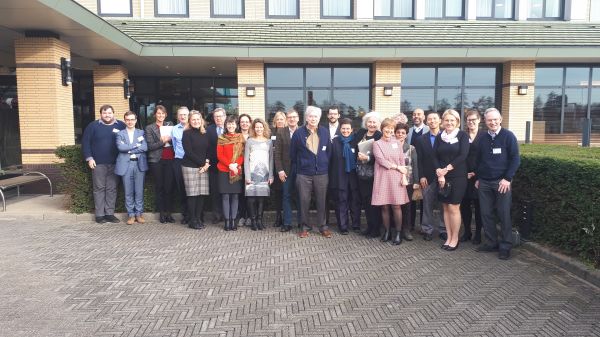Updating management recommendations of cardiac dystrophinopathy
- Number 238
- Date 30 November 2018
Location: Hoofddorp, the Netherlands
Title: The 238th ENMC International workshop on "Updating management recommendations of cardiac dystrophinopathy"
Date: 30 November – 2 December 2018
Organisers: Dr J. Bourke (UK), Prof. D. Duboc (France), Dr M. Guglieri (UK)
Translations of the lay report:
Czech by Dr S. Šedivá
German by Dr A. Florian
French by Dr K. Wahbi
Participants: Prof. A. Aartsma-Rus (The Netherlands), Dr A. Bandali (UK), Dr N. Bennet (UK), Dr J. Bourke (UK), Dr B. Cools (Belgium), Prof. L. Cripe (U.S.A), Prof. S. Dittrich (Germany), Prof. D. Duboc (France), Dr A. Florian (Germany), Prof. N. Goemans (Belgium), Dr I. de Groot (The Netherlands), Dr M. Guglieri (UK), Dr K. Hor (U.S.A), Mr. F. van Ieperen (The Netherlands), Dr G. McGowan (UK), Dr E. McNally (U.S.A), Prof. E. Pegoraro (Italy), Prof. L. Politano (Italy), Dr M. Sediva (Czech Republic), Dr V. Stara (The Netherlands), Dr J. Timmermans (The Netherlands), Drs E. Vroom (The Netherlands) and Dr K. Whabi (France),
The 238th ENMC workshop was convened between 30 November and 2 December 2018 and brought together neuromuscular and cardiology experts from Europe and United States to discuss cardiac care of patients with Duchenne and Becker muscular dystrophy. The aim was to build on the extensive International Care Considerations DMD 2010 1 and 2018 2 guidelines, adding the latest evidence and collating expert opinion on cardiac management of patients with conditions caused by mutations in the dystrophin gene.
Implementation of multidisciplinary care, including steroid therapy and timely support for respiratory muscle weakness has already improved survival in Duchenne muscular dystrophy (DMD). However, it is increasingly apparent that deterioration in heart function is critical to long term survival. Silently progressive cardiomyopathy (loss of the heart pump function) affects almost all patients with DMD but only causes symptoms in later years with the onset of heart failure. Currently, there is a lack of agreement about at what age or on the basis of what test results a patient should start heart-specific medications. Some clinicians use an ultrasound test (echocardiography) to detect weakness of the heart's main pumping chamber (left ventricular dysfunction) and others test for the presence of scars in heart muscle (myocardial fibrosis) using cardiac magnetic resonance imaging (cMRI) testing. However, the workshop concluded that the heart is affected from the beginning (even before birth) in DMD. As such, each testing method used to justify starting heart treatments simply reflects what each is capable of 'seeing' in the progressive process of heart involvement in DMD. The lack of sensitivity of standard echocardiography in detecting early abnormalities of heart muscle and technical issues around obtaining high quality and standardised magnetic resonance imaging of the heart across centres and in younger patients were recognized. The expert consensus was that families should be made aware around the time of diagnosis that heart care will be important throughout life. The particular heart drugs recommended - whether available now or developed in the future, and the optimum time to introduce them depend on what they are designed to do and the balance between their effectiveness and side effects.
Interesting detail was presented about the benefits of specific exercise programs for patients with DMD and the cardiovascular effects which might result. This will be the subject of ongoing research.
In a wide-ranging discussion about adults with DMD, Becker muscular dystrophy (BMD) and female- carriers of BMD/DMD, the consensus was that using devices that can correct serious, abnormal heart rhythms (implantable defibrillators) should be discussed as for patients with other forms of cardiomyopathy. Patients with less severe DMD, those with BMD and female carriers are already considered for transplantation or left ventricular assist devices (small implantable device to strengthen heart pumping) in several centres. However, it was accepted that the severity of DMD makes heart transplantation inappropriate for most patients with that condition.
The need to collect longitudinal data on the effects of different medications/interventions and the priority of reaching agreement with regulators about clinically meaningful research outcome measures for the heart in DMD was agreed.
The workshop concluded by acknowledging the many gaps that remain in our understanding of cardiac involvement in dystrophinopathies but also the promise of treatments currently under evaluation. A number of themes for collaborative research were also identified.

A full report is published in Neuromuscular Disorders (pdf).
1. Bushby K, Finkel R, Birnkrant DJ, et al. Diagnosis and management of Duchenne muscular dystrophy, part 2: implementation of multidisciplinary care. Lancet Neurol 2010, 9(2):177-189.
2. Birnkrant DJ, Bushby K, Bann CM, et al. Diagnosis and management of Duchenne muscular dystrophy, part 2: respiratory, cardiac, bone health and orthopaedic management. Lancet Neurol 2018, 17(4):347-361.
